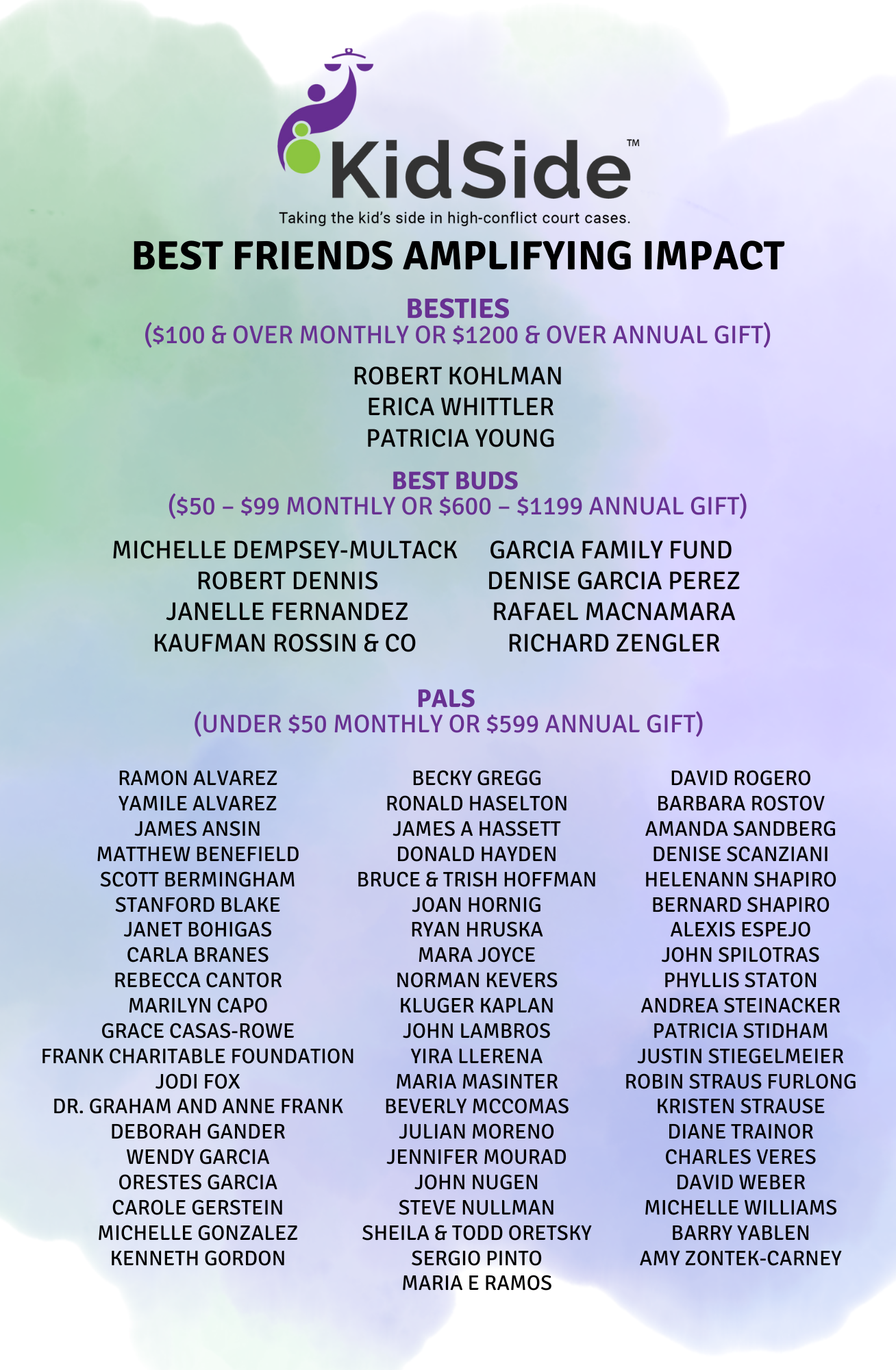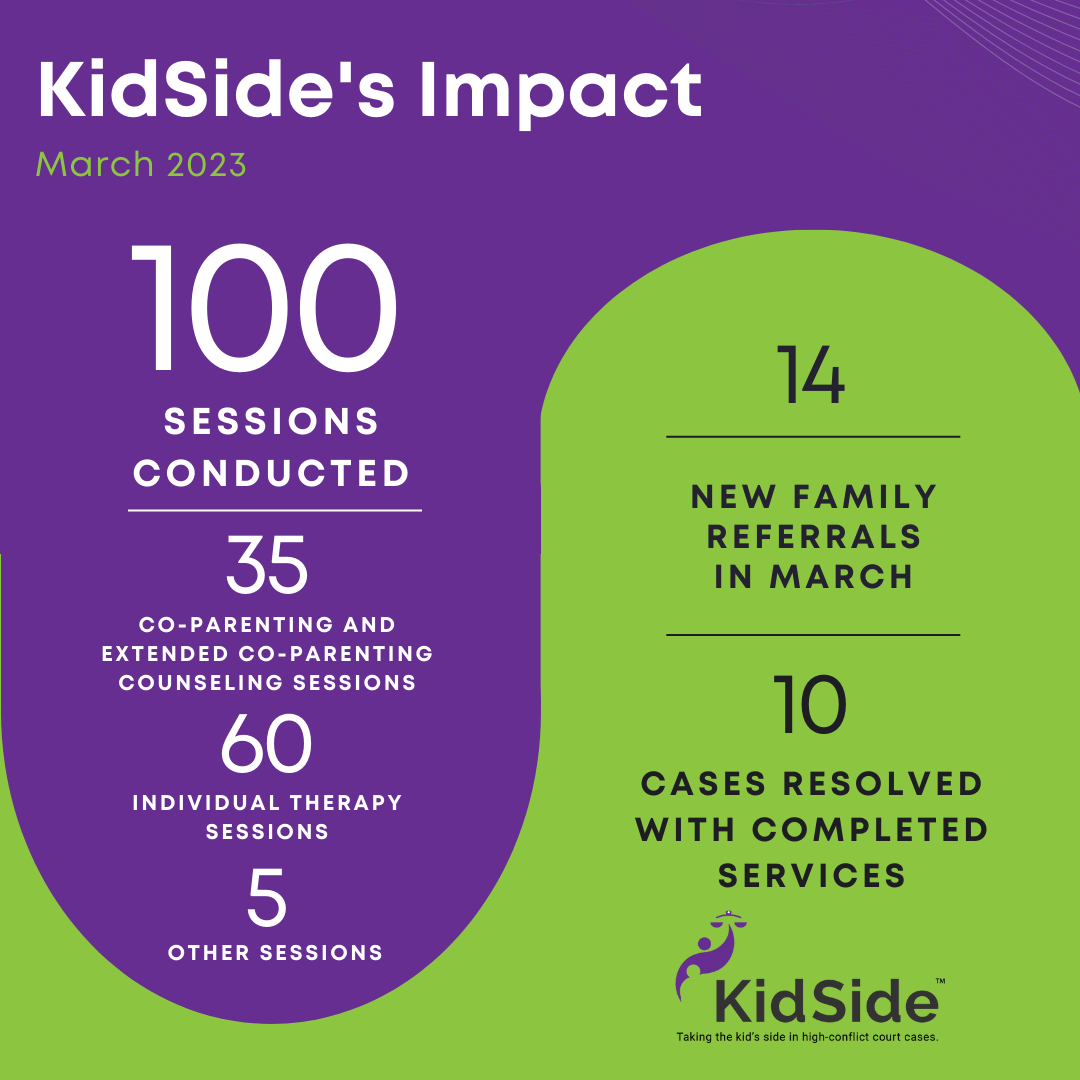KidSide Newsletter April 2023

Parental Alienation

Written by Gina Mendez-Locke | gmendez-locke@jud11.flcourts.org
As a Magistrate in the Family Division, I am often asked what are the most difficult cases I hear. While relocations come to mind, parental alienation cases are, for me, the most difficult. Although I find that attorneys generally employ the term “parental alienation” far too casually and far too frequently, I do believe that it does exist and, when it does, it is truly alarming and harmful.
I describe parental alienation as a pattern of behavior by one parent to disrupt, or even terminate, the relationship between the child and the other parent. At its worst, the alienating parent is seeking to seemingly eradicate the other parent from the child’s life. The alienating parent uses whatever power and/or control she or he has over the child to make the child love the other parent less, to believe that the other parents does not love her or him, to fear the other parent, or even to hate the other parent. A child who is subject to such behavior is a victim of abuse, albeit not physical, and will suffer long term consequences.
This article will not address the mental health of the parents who engage in alienation or the effects of parental alienation on the mental health of a child. Instead, I seek to address some challenges we, as judicial officers, have when faced with allegations of parental alienation and what lawyers and mental health professionals can do to effectively present the issue to us so as to aid us in our decision-making process. For illustration purposes, I include anecdotes from cases I have had which required me to rely on many sources to make my decision.
Parental Alienation: What It Is and What It Isn’t

Written By Raquel Miguel Firpi, Ph.D. | drfirpi@gmail.com
Parental Alienation is a concept that often generates controversy and even some strong emotional reactions in the professional and lay community alike. It is also a concept about which there is a significant amount of disinformation.
Parental Alienation is NOT a disorder found in the DSM 5 categorization of psychiatric disorders. That does not mean it does not exist as an identifiable psychological entity. The DSM 5, the DSM is not an encyclopedia of every psychiatric disorder. As we can see by the number of editions containing substantive diagnostic changes over the years, it is a diagnostic guide for psychiatric disorders recognized by the American Psychiatric Association. The DSM series has done a great job identifying individual psychopathological conditions. The DSM series may be less successful in identifying and specifying criteria for relational pathologies.
Parental Alienations exists as an identifiable entity and has many defined characteristics, “diagnostic” criteria, and short/long-term consequences for children.
It is NOT just defined by contact refusal. It is a complex phenomenon with multiple characteristics and criteria that typically occur along a continuum of parental behavior and may result in a mental condition in which a child – usually one whose parents are engaged in a high conflict divorce – allies himself or herself with an alienating parent and rejects a relationship with the target parent without legitimate justification (Lorandos, Bernet Sauber, 2013). The child develops a false belief that the rejected parent is evil, dangerous, not worthy, etc. The relational manifestation this condition results in an aberration in the relationship between the child and the rejected parent (absence of communication, camaraderie between child and parent even though they previously had a loving, nurturing relationship). Rejection of the target parent is without legitimate justification and far beyond anything the rejected parent has done to justify estrangement of such significant proportion.
Thank You KidSide Supporters

Thank you to the Best Friends Amplifying Impact program we are able to fund free therapy to families in need. No child should be on a waiting list to see their parent or to receive counseling services due to financial difficulties. KidSide is funding the supervision of several skilled doctoral level psychology clinicians to provide these services.
Parent Testimonial

The testimonial below is from anonymous parents with two elementary aged children sent for co-parenting sessions paid for by KidSide:
This process allowed us to speak openly and honestly without the stress of a court room. We listened to each other for the first time in a long time without becoming defensive or angry. As a result, we began to share important information about our children. This improvement paved the way for both of us to attend our children’s sporting event together for the first time in one and a half years. The smile on our children’s faces were priceless.
Your Donations At Work

Welcome To Our New KidSide Partners

We are proud to welcome our newest partner to the KidSide family. Thank you to new Silver Partner, Cole, Scott an Kissane P.A.
Thank You KidSide Partner

Looking to make a splash in the community to start the new year? Join KidSide as a partner and get recognized in the KidSide newsletter and on social media, plus other fantastic benefits. Thank you to all of our existing partners for their continued support of KidSide.
Support the work of Family Court Services by donating to KidSide!


